Origin and development
The question of a special unified rite for the order received no official attention in the time of St. Dominic, each province sharing in the general liturgical diversities prevalent throughout the Church at the order's confirmation in 1216. Hence, each province and often each convent had certain peculiarities in the text and in the ceremonies of the Holy Sacrifice and the recitation of the Office.
The first indication of an effort to regulate liturgical conditions was manifested by Jordan of Saxony, the successor of St. Dominic.
The first systematic attempt at reform was made under the direction of John the Teuton, the fourth master general of the order. At his suggestion the Chapter of Bologna (1244) asked the delegates to bring to the next chapter (Cologne, 1245) their special rubrics for the recitation of the Office, their Missals, Graduals and Antiphonaries, "pro concordando officio". To bring some kind of order out of chaos a commission was appointed consisting of four members, one each from the Provinces of France, England, Lombardy, and Germany, to carry out the revision at Angers. They brought the result of their labours to the Chapter of Paris (1246), which approved the compilation and ordered its exclusive use by the whole Order and approved the "Lectionary" which had been entrusted to Humbert of Romains for revision.
Another force preservative of the special Dominican Rite was the Decree of Pius V (1570), imposing a common rite on the universal Church but excepting those rites which had been approved for two hundred years. This exception gave to the Order of Friars Preachers the privilege of maintaining its old rite, a privilege which the chapters of the order sanctioned and the members of the order gratefully accepted.
Several times movements have been started with the idea of conforming with the Roman Rite; but these have always been defeated, and the order still preserves the rite conceded to it by Pope Clement in 1267. [NLM: until our own modern day of course with the adoption of the Pauline Missal by the Dominican Order]
The Dominican Rite, formulated by Humbert, saw no radical development after its confirmation by Clement IV. When Pius V made his reform, the Dominican Rite had been fixed and stable for over three hundred years, while a constant liturgical change had been taking place in other communities. Furthermore the comparative simplicity of the Dominican Rite, as manifested in the different liturgical books, gives evidence of its antiquity.
The collection of the liturgical books now contains: (1) Martyrology; (2) Collectarium; (3) Processional; (4) Antiphonary; (5) Gradual; (6) Missal for the conventual Mass; (7) Missal for the private Mass; (8) Breviary; (9) Vesperal; (10) Horæ Diurnæ; (11) Ceremonial.
With the exception of the Breviary, these books are similar in arrangement to the correspondingly named books of the Roman Rite.
Dominican Liturgical Year
The Dominican Breviary is divided into Part I, Advent to Trinity, and Part II, Trinity to Advent. Also, unlike the Tridentine usage of the Roman rite and similar to the Sarum rite and other Northern European usages of the Roman rite, the Dominican Missal and Breviary counts Sundays after Trinity rather than Pentecost.
The Dominican Missal (Missale Sacri Ordinis Praedicatorum)
The most important is in the manner of celebrating a low Mass. The celebrant in the Dominican Rite wears the amice over his head until the beginning of Mass, and prepares the chalice as soon as he reaches the altar. The Psalm "Judica me Deus" is not said and the Confiteor, much shorter than the Roman, contains the name of St. Dominic. The Gloria and the Credo are begun at the centre of the altar and finished at the Missal. At the Offertory there is a simultaneous oblation of the Host and the chalice and only one prayer, the "Suscipe Sancta Trinitas". The Canon of the Mass is the same as the Canon of the Roman Rite, but after it are several noticeable differences. The Dominican celebrant says the "Agnus Dei" immediately after the "Pax Domini" and then recites the prayers "Hæc sacrosancta commixtio", "Domine Jesu Christe" and "Corpus et sanguis", then follows the Communion, the priest receiving the Host from his left hand. No prayers are said at the consumption of the Precious Blood, the first prayer after the "Corpus et Sanguis" being the Communion. These are the most noticeable differences in the celebration of a low Mass.
In a solemn Mass the chalice is brought in procession to the altar during the Gloria, and the corporal is unfolded by the deacon during the singing of the Epistle. The chalice is prepared just after the subdeacon has sung the Epistle, with the ministers seated at the Epistle side of the sanctuary. The chalice is brought from the altar to the place where the celebrant is seated by the sub-deacon, who pours the wine and water into it and replaces it on the altar. The incensing of the ministers occurs during the singing of the Preface. Throughout the rite the ministers also stand or move into various paterns rather different those of the old Roman Liturgy.
[Some pictures of the Mass according to the Dominican rite.]
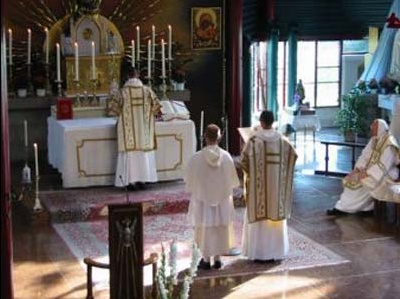
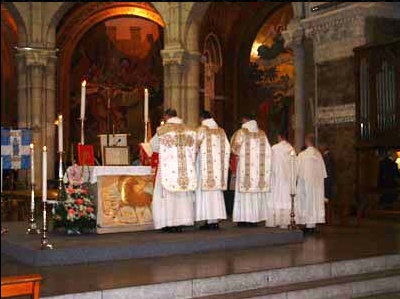
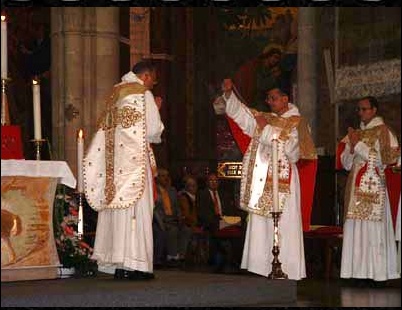
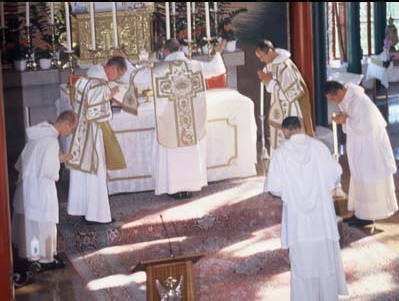
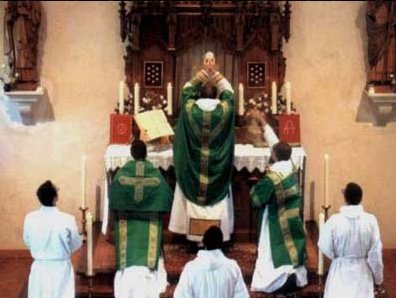
The Dominican Breviary (Brevarium Sacri Ordinis Praedicatorum)
[NLM: there is a difference between the breviary used before Pius X's reform, and shortly thereafter. Someone here referenced Bonniwell's history of the Dominican liturgy, and I believe the date given for the reform of the Dominican Breviary came in the 1920's. This source is the 1917 Catholic Encyclopedia. It would be good to confirm whether this description speaks of the Dominican breviary prior to, or after in response to Pius X's reform of the breviary.]
The Dominican Breviary differs but slightly from the Roman. The Offices celebrated are of seven classes: of the season (de tempore), of saints (de sanctis), of vigils, of octaves, votive Offices, Office of the Blessed Virgin, and Office of the Dead. In point of dignity the feasts are classified as "totum duplex", "duplex" "simplex" "of three lessons", and "of a memory".
There is no difference in the ordering of the canonical hours, except that all during Paschal time the Dominican Matins provide for only three psalms and three lessons instead of the customary nine psalms and nine lessons.
The Office of the Blessed Virgin must be said on all days on which feasts of the rank of duplex or "totum duplex" are not celebrated. The Gradual psalms must be said on all Saturdays on which is said the votive Office of the Blessed Virgin. The Office of the Dead must be said once a week except during the week following Easter and the week following Pentecost. Other minor points of difference are the manner of making the commemorations, the text of the hymns, the Antiphons, the lessons of the common Offices and the insertions of special feasts of the order.
There is no great distinction between the musical notation of the Dominican Gradual, Vesperal and Antiphonary and the corresponding books of the Vatican edition. The Dominican chant has been faithfully copied from the MSS. of the thirteenth century, which were in turn derived indirectly from the Gregorian Sacramentary. One is not surprised therefore at the remarkable similarity between the chant of the two rites.